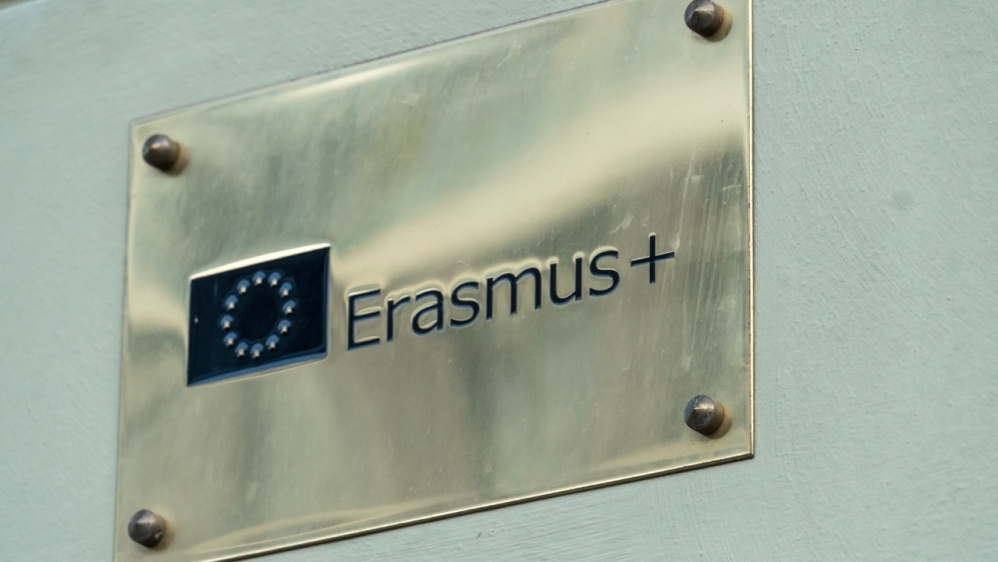Young Hungarians will vent their anger on the Brussels bureaucracy instead of the country’s maverick government.
Some weeks ahead of the application deadline, tens of thousands of prospective university students gathered at the packed Hungexpo Budapest Congress and Exhibition Center in mid-January. The three-day event featured forty institutions of higher education, as well as a wide variety of language schools, internship opportunities, dual learning programs, and a lot more. An atmosphere of bustling energy and forward-looking optimism could be sensed in the air among the young people who had traveled to the capital from all corners of the Carpathian Basin to be present (although an online option was available). Crowds were huge and not a single visitor was wearing a mask. The young Hungarians at the Educatio 2023 exhibition clearly didn’t appear to be “under siege” from anyone, let alone the distant and shadowy Brussels bureaucracy.
Yet the European Commission’s New Year message to young Hungarians was anything but positive. Just a few days before the expo, on January 9, news broke that the European Union is suspending the Erasmus+ educational exchange program and the Horizon Europe scientific research initiative for Hungary’s twenty-one foundation-run universities. This means that EU grants will no longer be available for the bulk of 20,000-plus Hungarians who annually take part in exchange programs directed at students in higher and public education, as well as vocational and adult training schemes. The decision applies to applications assessed after December 15, 2022.
The suspension of Erasmus+ funding is the latest stage in the European Union’s bid to block the country’s access to Recovery and Resilience funds, citing what the Commission calls the “continued risk to the EU budget”. In a recent press statement, it claims that further progress in “key institutional reforms to strengthen the rule of law” are necessary, pointing out that “no payment under the RRF is possible until Hungary has fully and correctly implemented” the twenty-seven so-called “super milestones” set by the Commission. It is clear, however, that the bureaucratic procedure is only part of a comprehensive and thinly-veiled attempt to change the direction taken by the Hungarian government on issues ranging from its pro-peace stance on Ukraine to identity politics and family policy. The objective is to set an example and dissuade European voters of voting against the left-liberal establishment – at whatever cost.
On a rhetorical level, even the fiercest critics of the Hungarian government have been careful to distinguish between the country and its populace on the one hand and its political leadership on the other. Ever since the adoption of the new media law in 2010 and the country’s new Fundamental Law the next year, they have insisted that the consistent and politically motivated attacks on the democratically elected government have the best interests of the country and its people in mind. They routinely reference their apparent affection for Hungarian culture and history before launching into tirades against supposedly undemocratic or discriminatory legislation. In this case, however, it is clearer than ever that everyday Hungarians are meant to bear the brunt of the Brussels war on Hungary.
What is especially striking is that the decision to exclude so many Hungarian students and academics from the program directly defies the EU’s own policy objectives. The Council’s official website tells us that the program aims to “promote non-formal and informal learning mobility and active participation among young people, as well as cooperation, quality, inclusion and equity, excellence, creativity and innovation”. Another article explains that Erasmus+ students are two and a half times more likely to have transnational relationships than those who stay home during their studies, adding that the program enhances students’ quality of life and career prospects.
Indeed, it is generally agreed that international mobility programs like Erasmus+ are among the most tangible and “relatable” benefits of EU membership. The scheme, launched in 1987, has enabled countless Hungarian students and academics to gain invaluable experience in a foreign educational institution, improve language knowledge, and form lasting friendships. For many students with limited financial means, an Erasmus+ scholarship is a unique opportunity to spend time abroad and become familiar with another culture. By turning the Erasmus+ into a political battleground, the European Union risks severing the link to young Hungarians. It should, then, come as no surprise that the EU blackmail has spectacularly backfired. According to one poll, a cross-party majority of almost eight in ten (77 percent) of young Hungarians aged 18-29 disagree with the European Union’s decision to suspend funding for the Erasmus+ program. This is despite earlier research, conducted by Eurobarometer, showing that over two-thirds (69 percent) of 15-24-year-olds have trust in the EU.
It is, in fact, hard to guess why the European Union has taken aim at the some 100,000 young Hungarians, who – according to the Hungarian Youth 2020 survey – had plans to study abroad. One possible explanation, especially in the wake of recent student protests, is that the decision is a cynically engineered publicity stunt designed to stir up anti-government sentiment and drive young people to the streets. In any case, there have been no student protests relating to this matter since the announcement and the Hungarian cabinet has promised to compensate students, with Prime Minister Viktor Orbán pledging in a radio interview that prospective grant recipients will “suffer no harm at all”.
The European Union’s latest ploy against Hungary is misguided and irrational at every level. By resorting to targeting university students, it is merely throwing a spanner into its own works and will lead many to reconsider the costs and benefits of EU membership.



